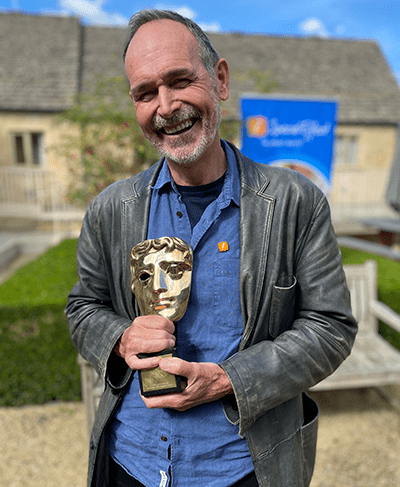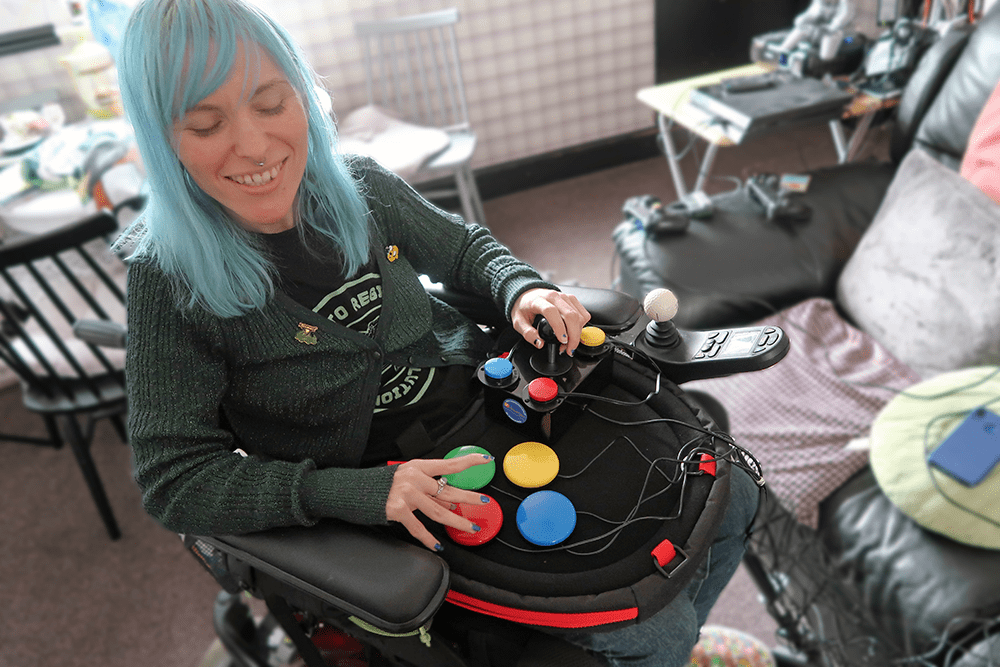Mick Donegan’s ‘innovative and essential’ work making video games accessible to people with disabilities has been recognised by a BAFTA Special Award.
 Freedom, fun and friendship: what video games offer us
Freedom, fun and friendship: what video games offer us
More than three billion people play video games – that’s two out of every five people on earth.
SpecialEffect Chief Executive Dr Mick Donegan MBE (BEd Education, 1975; PhD Education, 2006) says: ‘These magical worlds challenge our brains, whether we’re solving a puzzle, racing go-karts or defeating an end-of-level boss. They are often a social and bonding experience, whether playing with a sibling on the same sofa or forming a team with new friends online.’
However, video games often involve small buttons and complex manual dexterity, so many people with disabilities can’t play them. Mick decided to do something about it.
Teaching and technology
Mick vividly recalls spending time growing up with his cousin, who has learning difficulties. He says: ‘One of my earliest memories was trying to teach him to say my name. I could see how frustrated he was at not being able to do so and that stayed with me.’
Mick’s first degree at Birmingham launched his career as a teacher, supporting pupils with disabilities. He explained: ‘I was a teacher when the first BBC computers came out in schools in the 1980s and I saw the impact it made. For example, pupils with dyspraxia or dyslexia could use a keyboard and print out something perfect, instead of struggling with repeatedly writing and crossing out words or numbers; it made a massive difference to their self-confidence. But it was the games that had the most potential to bring people joy!’

Levelling up his skills back at Birmingham
After working at a charity specialising in technology and communication, Mick returned to the University to develop his understanding of the possibilities that technology could provide. Mick says: ‘My late tutor in the Department of Disability, Inclusion and Special Needs, Dr Penny Lacey, was a remarkable inspiration for my PhD and very knowledgeable in special needs.’
Looking back, it's clear to me that without the two degrees at Birmingham, very little of my career would have happened. I owe the University a lot.
Opening up worlds for everyone to enjoy
In 2007, a year after graduating with his PhD, Mick founded specialist technology charity SpecialEffect, with a particular focus on games.
He says: ‘The primary aim of the charity is to help people of all ages, with even the most severe physical disabilities, to play video games.’ For example:
- A combination of large buttons and foot controls means Devina can play (and win) racing games against her brother, as her cerebral palsy means that a PlayStation controller is difficult to use.
- 53-year-old Steve uses his chin and eyes to play games, use the internet and message his family and friends, after he broke his spine in a motorbike accident. Mick helped develop the high-quality, low-cost gaze tracker Steve uses.
- Student Tiago, having received support to play games, is now learning to code and develop games himself at college, with accessibility built in.
Many also use the technology to speak, attend lessons while in medical isolation, communicate online and much more.
The multi-professional SpecialEffect team use what they learn from helping individuals across the UK to collaborate with software and hardware developers around the world to make videogames more accessible at source.
Their work was recognised with the BAFTA Special Award in April 2024, and Mick says: ‘The industry is starting to generate real change, from audio and vibration cues that help gamers battle enemies they can’t see, to dance game routines optimised for people who are just using their upper body.’